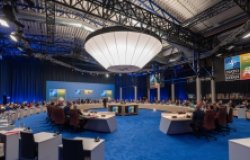Fixing Yugoslavia
Nov./ Dec. 2000 - The costs of Slobodan Milosevic's rule have been enormous to American and European taxpayers. According to the U.S. General Accounting Office, direct U.S. costs for fiscal years 1992 through 2000-mainly for war-waging and peacekeeping actions-have amounted to $21.2 billion. That figure exceeds the annual gross domestic product of Yugoslavia (Serbia and Montenegro), Kosovo, and Bosnia combined. Not that the GDP is much; Milosevic transformed his economy from a mess into a basket case.
The U.S. and its allies are entering a new phase of full-scale diplomacy by bribes, or, more diplomatically, "carrots," on issues ranging from Kosovo's final status to handing war criminal Milosevic over to an international tribunal. Before we spend any more on Yugoslavia, though, new President Vojislav Kostunica must deal with economic problems that are within his power to fix.
Reforming Yugoslavia's junk money is the most immediate priority. Thanks to Milosevic's monetary mischief, the value of the dinar has been wiped out repeatedly since 1991 by a string of maxi-devaluations. Not surprisingly, Yugoslavia went into the record books with the second-highest hyperinflation in world history (Hungary's post-World War II problem was the worst), peaking in January 1994 when the monthly inflation rate hit 313 million percent. Since early 1998, things have settled down; the dinar has only lost 81 percent of its value against the greenback.
Misbegotten monetary meddling is an age-old habit there. Serbian kings were notorious coin-clippers. As early as the 14th century, King Milutin minted imitation Venetian coins. That practice landed "the King of Rascia" in Dante's Divine Comedy, where he was denounced as a counterfeiter.
Kostunica must adopt the principles of sound money if he wants to make good on his professed desire to embrace the rule of law-and if he wants to resuscitate his economy. Those principles put currency in the same class as a bill of rights and obstruct the state's ability to fiddle with money. Two options are available: A new Yugoslav denomination could be issued by a currency board or a foreign currency could replace the dinar.
These work for Serbia's neighbors. In 1997, under the mandate of the Dayton Agreement, Bosnia launched a currency board whose governor is a foreign national. The Bosnian board issues a convertible marka that is fully backed by German marks and freely trades at a strict 1-to-1 rate against the mark. In 1999, both Kosovo (September) and Montenegro (November) replaced the Yugoslav dinar with the German mark.
Either option would unify Yugoslavia's monetary regime with Europe's, partially satisfying another of Kostunica's objectives. Kostunica, an ardent nationalist, may have difficulty accepting either a foreign currency or a foreigner as head of a currency board. But in light of the country's past, outside leadership is the only way to reassure the world that Yugoslavia's monetary arrangements are well run and clearly aboveboard.
The next priority is to eliminate the payments bureaus, Yugoslavia's unique communist-era institutions that are totally incompatible with a market economy. No legal transactions can occur unless they go through these offices-and pay a fee.
Although they appear to serve a financial purpose, the bureaus primarily serve the police. They keep tabs on every dinar. This explains how Milosevic could exert such control. It also explains how the dictator's Socialist party and organized crime generate income. With informants in the bureaus, politicos and mafiosi always know where the dinars are. Armed with records from the payments bureaus, they can demand their cut of cash flows.
If Kostunica takes these necessary steps, Yugoslavia will move a lot closer to being a normal country. But as Bosnia has discovered, there is much more needed than just sound money and banking. The title of a report issued by the General Accounting Office in July tells it all: "Crime and Corruption Threaten Successful Implementation of the Dayton Peace Agreement." Keep the champagne corked.
Reprinted by Permission of Forbes Magazine.
© 2000 Forbes Inc. November 13, 2000 issue.
Steve H. Hanke is a professor of applied economics at The Johns Hopkins University in Baltimore and chairman of the Friedberg Mercantile Group, Inc. in New York.
About the Author
Steve Hanke
Read More
Global Europe Program
The Global Europe Program is focused on Europe’s capabilities, and how it engages on critical global issues. We investigate European approaches to critical global issues. We examine Europe’s relations with Russia and Eurasia, China and the Indo-Pacific, the Middle East and Africa. Our initiatives include “Ukraine in Europe” – an examination of what it will take to make Ukraine’s European future a reality. But we also examine the role of NATO, the European Union and the OSCE, Europe’s energy security, transatlantic trade disputes, and challenges to democracy. The Global Europe Program’s staff, scholars-in-residence, and Global Fellows participate in seminars, policy study groups, and international conferences to provide analytical recommendations to policy makers and the media. Read more










